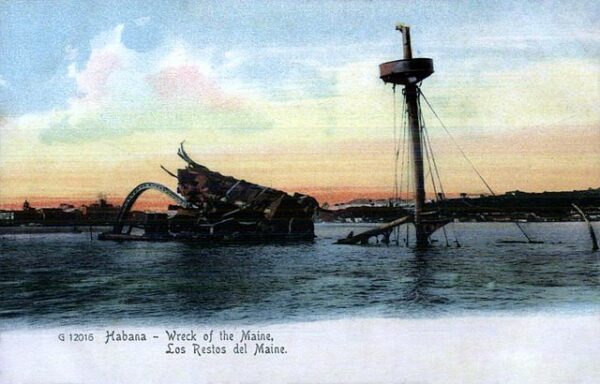On the evening of February 15, 1898, the USS Maine, an American naval battleship, met a catastrophic fate in Havana Harbor, Cuba. A massive explosion tore through the vessel, obliterating its forward section and igniting a firestorm of speculation and accusation. The Maine had arrived three weeks prior on a goodwill mission amidst rising tensions between the United States and Spain over the latter’s colonial policies in Cuba.
The explosion claimed the lives of 266 of the 355 crew members, a tragedy that shook the American public and military establishment to its core.
Immediately following the disaster, U.S. Navy investigators, along with journalists, scrambled to determine the cause of the explosion. Theories proliferated, ranging from an accidental ignition of the ship’s magazines to a clandestine attack by Spanish forces. The court of inquiry, unable to ascertain definitive evidence, suggested that a mine had detonated beneath the ship. American newspapers, particularly those owned by William Randolph Hearst and Joseph Pulitzer, seized upon the ambiguous findings, propelling a campaign of sensationalist reporting that inflamed public opinion and coined the rallying cry, “Remember the Maine, to Hell with Spain!”
The sinking of the USS Maine became a pivotal moment in the lead-up to the Spanish-American War. The American public, fueled by the fervor of yellow journalism and the perceived injustice against their countrymen, clamored for retribution. President William McKinley, who had initially advocated for diplomatic resolution, faced overwhelming pressure to act. On April 25, 1898, Congress declared war on Spain, marking the onset of a conflict that would alter the geopolitical landscape of the Western Hemisphere.
The war that ensued was brief and decisively one-sided. The United States emerged victorious after just a few months, stripping Spain of its remaining colonial possessions in the Caribbean and Pacific. The Treaty of Paris, signed in December 1898, granted the United States control over Cuba, Puerto Rico, the Philippines, and Guam. This acquisition marked a significant expansion of American influence and signaled the nation’s arrival as a world power.
The true cause of the Maine’s destruction remained a subject of controversy. Subsequent investigations in later years suggested that the explosion resulted from an internal accident, not Spanish sabotage. Nevertheless, the legacy of the USS Maine endures as a symbol of the precipitous events that can lead a nation from a posture of peace to the battlefields of war.






